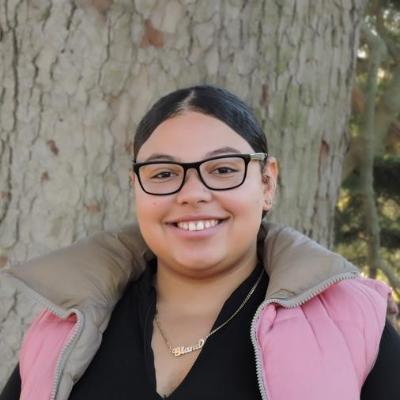
The Experience, Giana De La Cruz ’24
Specialized Resources

The Experience, Giana De La Cruz ’24
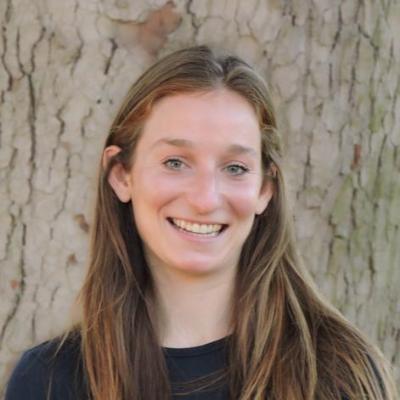
The Experience, Margaret Benson ’23
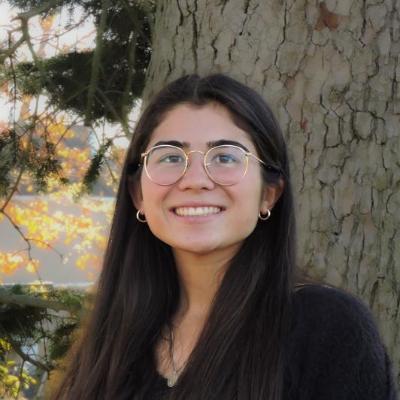
The Experience, Miya Preyer ’23
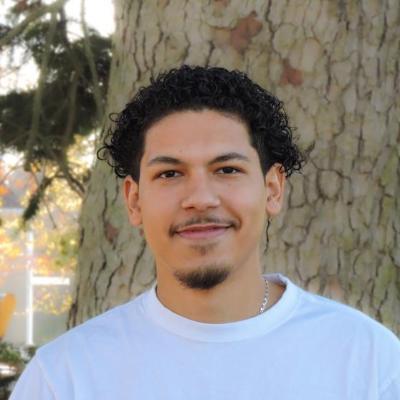
The Experience, Sebastian Arango Chiquillo ’23
Interview with Grace Flautherly ’23

The Experience, Miya Preyer ’23
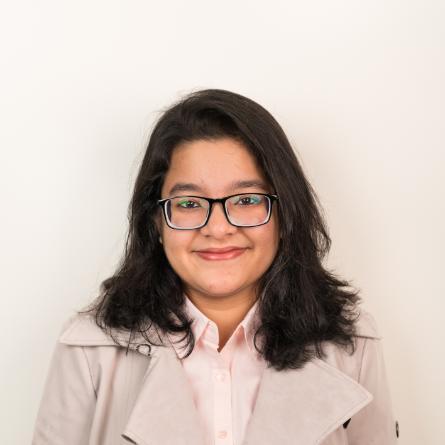
The Experience, Samirah Jaigirdar '22
Reflecting on my work with the Office of Communications

The Experience, Samirah Jaigirdar '22
Documenting my last Camel Day as a senior
Guest Blogger Maggie Newell ’19 of Lexington, Kentucky, is a film studies and environmental studies double major. She is the senior fellow for waste reduction in the Office of Sustainability, a representative for the Class of 2019 on Honor Council, and the treasurer of the women’s rugby team.
I love properly sorted waste. My passion for recycling began at a very early age. I was in the recycling club in elementary school, and in middle school I made a fairly embarrassing video with my mom to enter into the Green Team Kentucky Video Festival*...we did not win. At Conn, I have gone on to bigger and better things. I am the Senior Fellow for Waste Reduction in the Office of Sustainability. The Waste Reduction Team works with the campus community to expand and develop programs that will help the College reach its goal to reduce waste generation on campus by 5% by 2018. Needless to say, I know what goes in which bin. As someone “in the know” who cares about recycling I try to spread this information. I hope to steer others down the right path and to the right bins. I’ve gotten mixed results.
Continue ReadingThe Office of Sustainability is hiring! We have five fellow position openings. Please see the brief descriptions below and check out our website for full descriptions and applications. If you have any questions please email Josh Stoffel at jstoffel@conncoll.edu
Content Editor and Developer Fellow:
The Content Developer and Editor will serve on the Communications Team and assist the Office of Sustainability in developing the most effective and easy to understand communications with its constituents. The Content Editor and Developer Fellow will work on crafting written work about the office that will appear on the Conn website, sustainability blog, and social media accounts. They may also coordinate with various other media organizations on behalf of the office (The College Voice, CC Magazine, etc)
Lending Library Fellow:
The Lending Library Fellow will be responsible for managing all aspects of the Lending Library in collaboration with the Office of Sustainability. The Lending Library Fellow will manage and organize the lending library, keep account of cataloging and ordering new books, coordinating student volunteers to staff the library, and help brainstorm ways the library can increase its presence on campus.
Sustainable Facilities Fellow:
The Sustainable Facilities Fellow will work with the Office of Sustainability to collaborate with people throughout the community to help expand the College’s existing sustainability efforts related to new construction, major renovations and building maintenance. The Sustainable Facilities Fellow will help to implement and execute the Sustainable Building Policy, collaborating with Custodial Services to formalize a Sustainable Cleaning Program for every building on campus, and assisting in the development of working groups to monitor performance of new and existing buildings – making adjustments to the systems and processes in place to increase the sustainability of each building.
Waste Minimization Fellow:
The Waste Minimization Fellows will work with the Office of Sustainability to collaborate with people across the community to expand existing programs and create new programs that help the College strive for its goal to reduce waste generation on campus by 5% by 2016. The Waste Minimization Fellow will monitor and help adapt the Office Waste Minimization Program, co-manage and advertise the spring Give N’ Go program, and develop strategies to decrease waste in residential houses.
Food Hub Development Fellow:
The Food Hub Development Fellow will work with members of the NLCFPC and collaborate with other members of the community to execute the implementation plan for establishing a Food Hub in New London County. A Food Hub is a business or organization that actively manages the aggregation, distribution, and marketing of source-identified food products primarily from local and regional producers to strengthen their ability to satisfy wholesale, retail, and institutional demand. The Food Hub Fellow will work on executing the year-one goals outlined in our Feasibility Study, conduct research on behalf of the Food Hub, and contribute to grant writing on behalf of funding parts of the Food Hub.
To apply please visit our page: http://www.conncoll.edu/sustainability/office-of-sustainability/open-positions/
or contact sustainability@conncoll.edu
Continue Reading
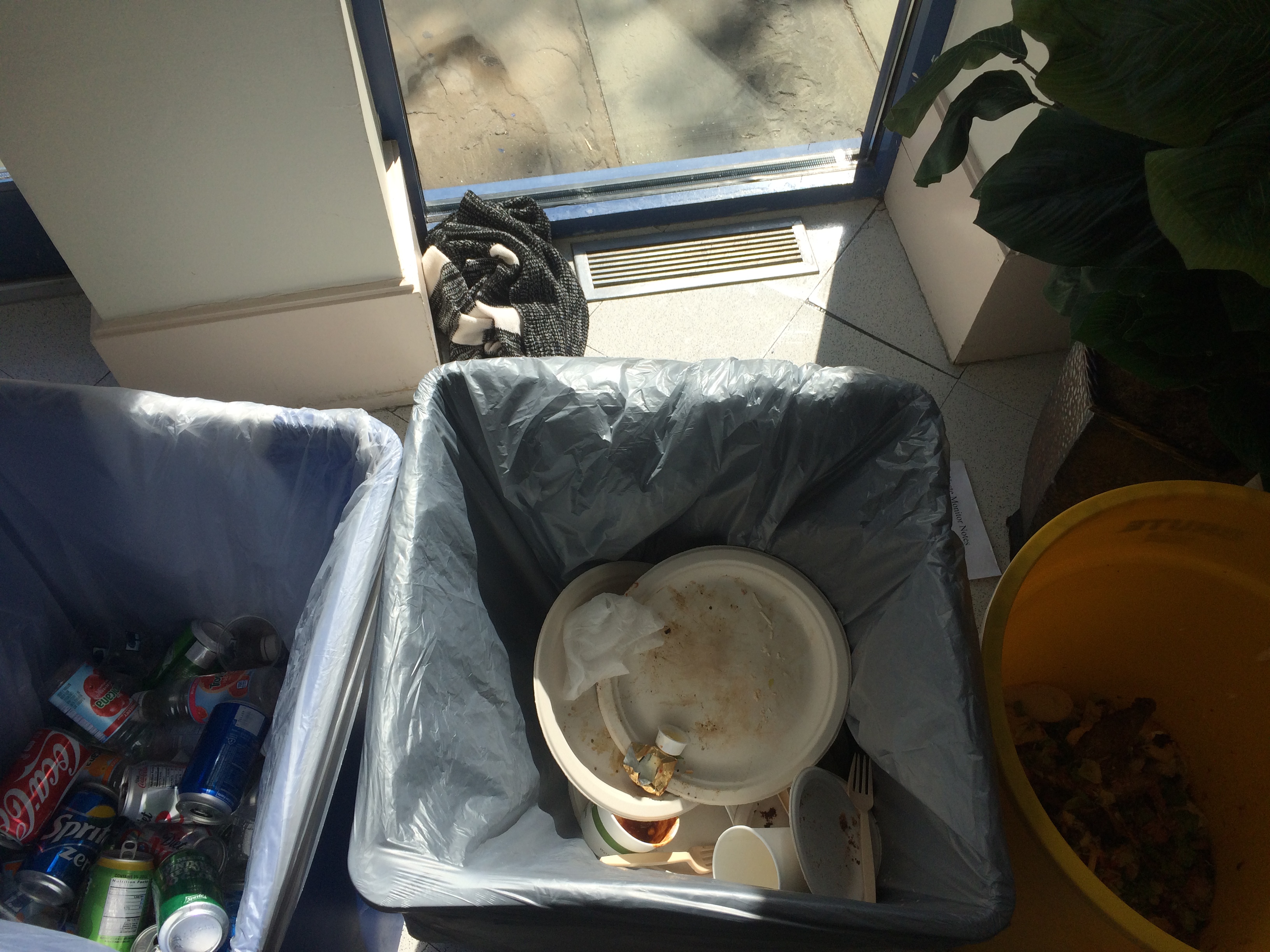
A few weeks ago, Connecticut College hosted the annual Fall Open House for prospective students. All of the over 700 participants in the Fall Open House attend a luncheon where visiting students and families can meet and talk to Conn College students and professors.
At the luncheon, the Office of Sustainability piloted a new Waste Monitors program. The purpose of the program is to divert food waste from the trash by having student workers stand by waste stations that consist of a trash bin, a recycling bin and a food waste bin.The students who staff the stations instruct luncheon attendees on how to separate their waste. This is an important program because of its environmental, social, and economic benefits. Diverting the food scraps reduces the volume of material entering the waste stream, through which it would be incinerated. Sending food scraps to the incinerator is a waste of energy and money. The food waste collected at Connecticut College is utilized by a local pig farm and thus, is supporting a local business and food producer. Finally, I personally believe it is important to note that this diversion is keeping the food in the food system and is therefore giving value to the time and energy that people put into its production.
During conversations with a number of prospective students and parents, we found that many were interested in the Waste Monitors program and the Office of Sustainability. A number of faculty members were also pleased to see such a program being put in place at such large events on campus. Overall the program ran smoothly! We were able to engage with students, parents, and professors about the importance of limiting the generation of food and other waste. We are very excited to continue this program next semester at the two accepted students’ days hosted by the College each spring, and hope that this type of waste diversion can become more integrated into how waste is handled at other large events hosted by Connecticut College.
Continue Reading
It’s a new semester in the Office of Sustainability, so we asked some of our newest fellows to answer the question: What brought you to the Office of Sustainability and what sustainable changes do you hope to foster on campus or in the community this year?
These are their responses:
Grace Finley '16:
I arrived at the Office of Sustainability through my interest in early intervention education, a subject that has driven my PICA scholarship for the last four years. In developing the CamelSprouts program, a nutrition curriculum aimed at preschool students in New London, I hope to provide opportunities for both students and parents to engage with their health and nutritional choices. I am especially excited by the implications of this program for lower-income students, who generally face increased challenges in achieving healthy practices.
Fara Rodriguez '16:
Curiosity initially brought my attention to the Office of Sustainability; however, I have a lot of friends that work or have worked in the office and they shared their experiences with me. Mainly the responses I heard about the office were that it is a very hands-on, flexible but also meaningful experience and I wanted to be a part of that. I also wanted to be more involved with the New London community, which I get to do through my position of Hodges Square Fellow. Lastly, I hope to be support the New London community. I have several skills that I want to improve and I believe I will learn a lot from the people that I will be working with in the Hodges Square Village Association.
Elizabeth Moreno '18:
I came to the Office of Sustainability when I learned that it is an economic luxury to be healthy and live a sustainable conscious lifestyle. I hope to create a more sustainable menu at the Connecticut College Children’s Program that supports local farmers while also promoting consumption of food that uses significantly less resources to produce. I also hope to teach children more sustainable ways to consume a healthy diet and in turn slowly reduce product demand for big food companies that have twisted morals.
Chloe Ocain '18:
My name is Chloe Ocain, and I'm a sophomore at Connecticut College. I wanted to be a part of the Office of Sustainability because it provides students with the support and opportunities to create positive change in their community. As one of the Farm-to-School fellows, I hope to educate children about sustainable agriculture and healthy eating, while providing the means by which students can easily access nutritious food.
Graham Koval '18:
I wanted to work with the Office of Sustainability to help and learn about creating sustainable energy projects on campus. As an athlete, I also want to help bridge the office and athletic teams to possibly work on some initiatives that could potentially benefit both groups and the school as a whole. I am excited to be apart and work on getting a solar system on campus this year.
Selena Pineda '18:
My friend, Kira encouraged me to join the Office of Sustainability and because I wanted to be involved on campus implementing change. I hope this year we are able to advance on the CamelSprouts Nutrition Education Program and Garden and connect more with the New London community.
Midhun Gelder '17:
I wanted to join the Office of Sustainability because I am passionate about being outdoors, and it’s important to me that there are places that we/I can go hiking and backpacking and such into the future. And the way to do that is to get involved with practicing/promoting sustainable practices.
Continue Reading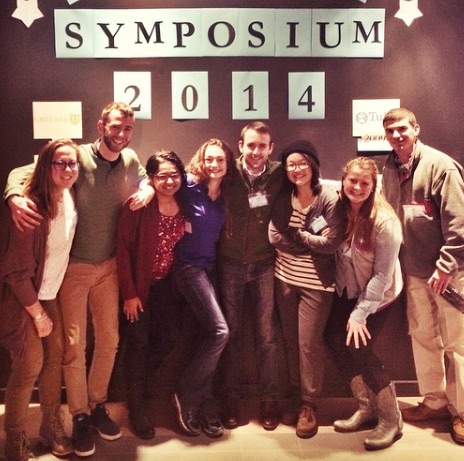
The Office of Sustainability at Connecticut College has been selected to host the first-of-its-kind Student Sustainability Leadership (SSL) Symposium. The symposium will be a two-day event that is focused on holistic sustainability and practical leadership skills and techniques.
On Saturday, November 7, student sustainability leaders from colleges across the Northeast are invited to participate in skill-building, interactive workshops. The symposium is an opportunity for aspiring student leaders to learn and be inspired by one another, while developing practical leadership skills that can be applied to their own campuses and communities. Preliminary ideas for workshops include: Effective Communication, Developing a Systems Thinking Approach to Problem-Solving, Power Mapping, Managing Up - How to Develop the Most Effective Relationship with Administrators, and Planning Ahead by Planning Backward.
The second day of the symposium, Sunday, November 8, is designed specifically for the Connecticut College community. It embodies the tenet of full participation by inviting community members, prospective students and alumni to join current students, staff, and faculty in enhancing practical leadership skills that will help us all develop sustainable communities locally, nationally and globally. To find out more about the symposium, click here.
We were chosen to host this event, despite being up against strong contenders because of our holistic view of sustainability. At Connecticut College we believe that sustainability is a framework by which long-lasting solutions to local and global challenges are developed through understanding the connections among social equity, environmental stewardship, and economic well-being and including all within decision making.
When I came back to campus at the beginning of August, I began working as the student coordinator for the SSL symposium. So far it has already been an amazing experience to be working on an event like this. In addition to being the first symposium that focuses on sustainable skill development in the Northeast region, it is also the first major event that the Office of Sustainability is hosting and planning, so I’m incredibly grateful to play such an important role. What is most exciting is that this symposium has the potential to make a big impact, whether it be on Conn’s campus, or another in the Northeast, or in a local, national or global community.
I feel that as a student it is easy to be discouraged when learning about current events and the challenges that surround us, and feeling incapable of generating real change. I want this symposium to make students feel empowered, and to understand that even their work on small scale projects are significant. My goal is that all attendees will walk away from the symposium feeling inspired, feeling confident that they can make a difference, and feeling that they can accomplish something great because of the skills and tools from the workshops that they can continue to develop.
The symposium is rapidly approaching, but I’m confident that with help from all of the other awesome fellows in the Office of Sustainability (Go team!) we can pull off a successful, intellectually stimulating, unique symposium.
Every year, students find that there are things in their dorm room they don’t want or need for the summer or next year. Instead of simply throwing away those items, we encourage students to donate them to Give and Go.
Give and Go is program run by the Office of Sustainability through which students can donate all unwanted items to local non-profit organizations that are connected to the United Way of Southeastern Connecticut.
Items that the non-profits have identified as being useful to them are:
- Lamps/Lighting
- Housewares and Supplies
- Electronics
- Clothing/Shoes
- Mini-Fridges
- Bedding/Linens - no foam egg crates or mattresses
- Food
- Books
Donation pick-up runs through finals and senior week, so you can start dropping off goods anytime between Saturday, May 9, and Commencement.
All the Give and Go Collection Points are set up in either the lobbies or common spaces of each dorm. Please donate any items that you do not wish to take home or store over the summer! If you have any questions, please feel free to contact the Office of Sustainability at sustainability@conncoll.edu.
Continue Reading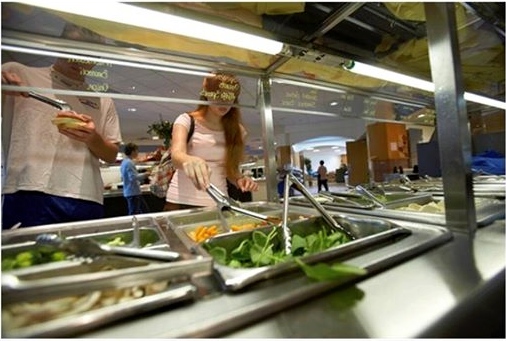
As the sustainable food systems fellow, I work with dining services to bring more sustainable food to campus. I am currently involved with a number of projects.
Kris Serwinski, the Purchasing Manager for Dining Services, and I are working to educate students on where our food on campus comes from and goes. Right now there is little information about this available to students and we are looking to change that. We plan to make posters with different facts to hang in the dining halls. We want to tell students that all of our post consumer food waste goes to the pigs at the Secchiaroli Farm and that all our bananas are fair trade. Knowledge of where our food comes from is socially just as it breaks down the barrier between consumers and producers, economically viable as it helps us to understand why certain food (locally grown, organic, ect.) costs more, and environmentally friendly as it makes us aware of how far our food it traveling to reach us. We really hope that students will be more excited to learn about their food.
I am also currently writing a proposal to SGA to get money from the Sustainable Projects Fund to finance the purchase of a few pieces of new equipment for the Dining Services staff. This equipment would allow Dining Services to buy more locally grown and less processed food, and be able to process it on site. This would allow them to support the local economy, reduce the distance that our food travels, and serve healthier food to students.
Finally, I am finalizing a project that was started almost a year ago to bring “Waste Monitors” to certain on campus events. We are mainly looking at Prospective Students Day in the fall and Accepted Students Days in the spring. These are events at which we serve food with disposable dishware. Currently at these events there are trash bins and recycling bins but no way to collect food waste separately. We hope to implement a program that adds a food waste bin to each station and plan to also hire two “Waste Monitors” to stand at the station and politely instruct people on how to separate this waste. This project is economically beneficial as it will greatly reduce the weight of our trash and cost no more for food waste disposal, and environmentally and socially just as it reduces waste. It will also show our perspective students that Conn is committed to holistic sustainability.
Continue Reading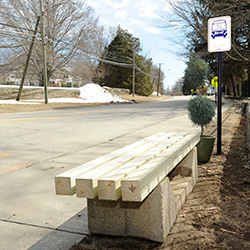
Our work has entailed three main components. First, we’ve been working to wrap up the project to install the SEAT bus stop at the edge of campus. This project was spearheaded mostly by Hallie Grossman '16 in previous semesters, but was just installed this semester. While the current bench and sign are just smaller placeholders until the bench and sign that were actually approved are installed, we’re ecstatic to have this historic piece in place to better connect the College to New London. Second, we are student representatives on the Dean of Student Life’s Transportation Task Force. On this committee, we work with staff and faculty to define, evaluate and propose improvements to the transportation offerings on campus so as to ensure their sustainability and equitability in terms of access.
Lastly, we’ve crafted a proposal to install electric car charging ports on campus. This proposal calls for a dual port Stage 2 charging station to be installed to significantly increase the usability (i.e. range) of an electric vehicle for any member of the college community wishing to transport themselves in this sustainable manner. We are in the process of trying to move this proposal through the appropriate channels of the administration.
Continue ReadingWorking in the Office of Sustainability is different than working in any other office or department or center on campus. While there is academic credit given, it is not all about academics. It is about skill development and hands-on praxis with regard to real challenges facing our community. In addition to this, the Office has connections to the wider New London community and a commitment to working with them; as well as working critically to create an open dialogue and a space that fosters inclusion and systems makes us different.
As a content developer and editor of the Office of Sustainability, I have learned a huge amount about working with others and developing effective communication strategies for an organization. With my position, I created a system and schedule for when blog posts are written, I have had to organize my time to ensure that I edit and organize blogs in a timely manner, and I have learned how to use a new computer software program in order to successfully post the blogs. All of these skills were ones I have highlighted in my resume and I have described in detail to potential employers. Only at the office did I have the opportunity to learn these skills and hands on experience using them.
Here are some experiences from other students that have worked and collaborated with the Office of Sustainability:
Julia Goldman ‘15: Through my position as Senior Fellow for the New London County Food Policy Council (NLCFPC), where I manage a team of six student fellows working on various community projects, I experience and interact with the local food system, examining the limitations and potential for growth. I have overseen projects including a double your dollars program for SNAP/WIC at farmers markets, a pilot program for farm to school education for preschoolers, a grow-a-row program with fresh produce to be donated to a local food center, and a food hub feasibility study, funded by a USDA grant. I make sure that each of the fellows are making progress in their area and help to connect them with community partners. This experience has taught me about the political framework which community projects operate and has familiarized me with a wide array of food related government programs and policies.
Soo Cho ‘17: I would say that the most important skill that I have learned while working with the Office of Sustainability, as a Senior Fellow for the Residential Fellows as well as the Children's Center's Garden Fellow, would be how to work with different personalities. People who work in the office come from all backgrounds and fields of study, so working with such a diverse group of students has given me the opportunity to develop a new kind of attentiveness.
Taryn Kitchen ’16: My work in the Office of Sustainability has helped me develop many professional skills: emailing, phone etiquette, website design, political prowess, time management, meeting planning, and so much more, while constantly thinking about how to thoughtfully collaborate with community organizations.
Marina Milan ’17: During my two years in working with the Office of Sustainability, I have learned a great deal about professional communication. I have honed my email writing skills and have learned how to work with other members of our college community in a mutually respectful and beneficial way. I have also learned to write complete yet concise proposals to target certain audiences and achieve my goals.
Check out the list of available positions here: http://www.conncoll.edu/sustainability/student-sustainability-programs/sustainability-fellows-program-/
Let us know what position you are interested in and send your resume and cover letter or questions to sustainability@conncoll.edu.
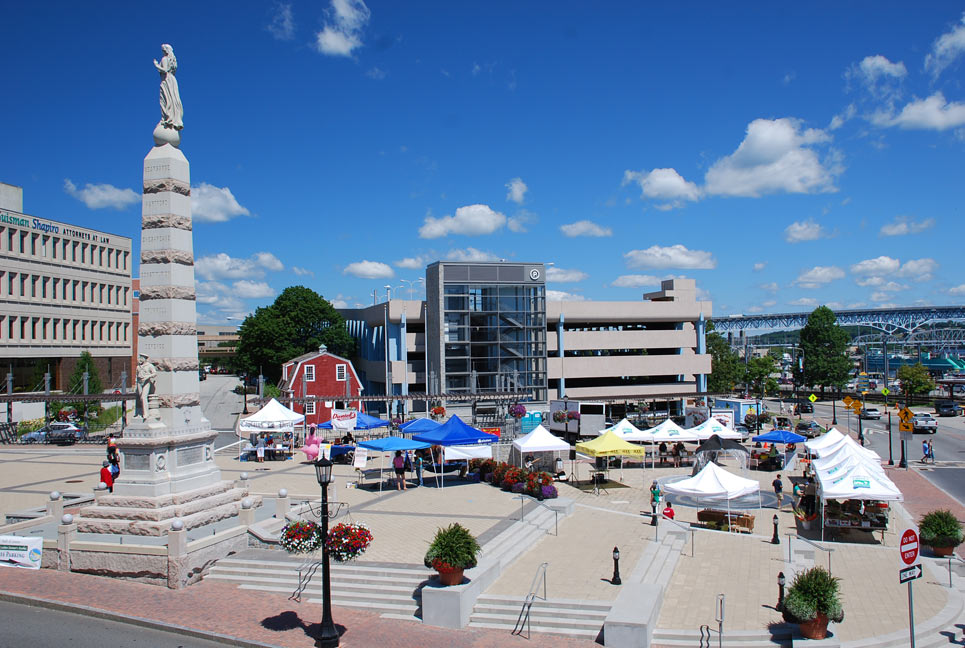
As the Affordability and Access Fellow for the New London County Food Policy Council (NLCFPC), it is my job to coordinate projects that combine both environmentally friendly initiatives with economically friendly policies, making fresh produce available at affordable prices to food insecure families. Currently I am working on developing a double value coupon program (DVCP) at several farmers markets in the county. Farmers markets are great places to get fresh, healthy produce while supporting local organic farmers, but we all know how expensive their fruits and veggies can be compared to supermarket prices. The DVCP is an effort to make this produce more affordable and available to individuals and families that receive benefits through the Supplemental Nutrition Assistance Program (SNAP).
First piloted by the Connecticut-based company Wholesome Wave in 2008, the double value coupon program doubles the purchasing power of SNAP users by providing funds to match any purchase made by a SNAP user at a farmers market. In other words, if a person buys $10 worth of produce on their SNAP card, the DVCP will give them another $10 worth of fruits or veggies. The funds to back this type of program are usually provided by an outside source, like Wholesome Wave or the NLCFPC, and then donated to participating markets. The funds will then be used to reimburse market vendors from whom DVCP purchases are made.
Our ultimate goal is to make farmers markets in New London County more equitable places by making the produce more affordable for food insecure individuals and families. In doing so, we also promote sustainable practices (buying fresh produce from local farmers rather than packaged and processed food from large supermarkets) across a broader range of socio-economic classes. The future of sustainable practices relies on everyone’s participation!
Continue Reading
This past summer, I interned with Wellness in the Schools (WITS), an organization that provides health and wellness programming in high-poverty New York public schools. After my summer with WITS, I was inspired to further research the benefits of early childhood nutrition education, which is how I became the Nutrition Education Fellow for the New London County Food Policy Council.
As part my senior integrative project for the Holleran Center, I will be piloting a nutrition education course at Connecticut College's Children's Program, which is located across Route 32 on Nameaug Avenue. Modeled after UConn's Husky Reads program, the main objectives of our Camel Sprouts program curriculum are:
- Provide basic nutrition education and healthy opportunities for preschoolers
- Improve willingness to try and recognize various foods
- Build a foundation for lifelong good health and well-being
- Motivate parents and caregivers to reinforce healthy behaviors
If you are interested in volunteering, please feel free to contact me! My email address is pziplow@conncoll.edu. We hope that our pilot program will become a permanent part of the Children's Program and other preschools within the greater New London County.
Continue Reading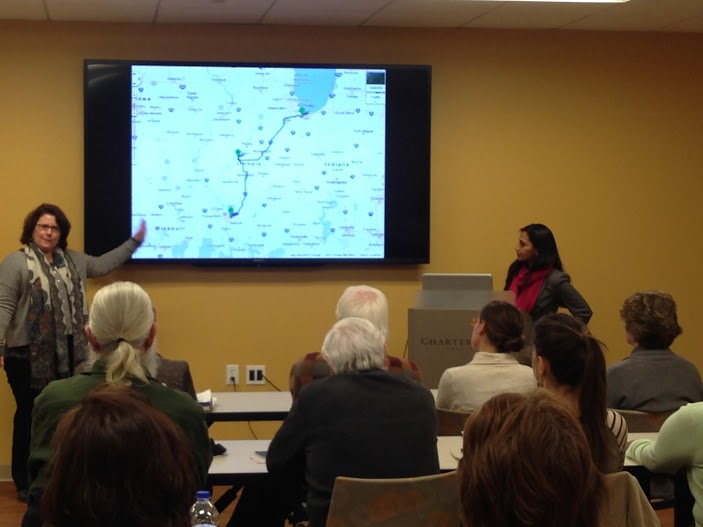
As a member of the New London County Food Policy Council Food Hub Project, we are currently partnered with the United Way of Southeastern Connecticut and New Venture Advisors in conducting a food hub feasibility study for New London County. The Council is a collaboration of food growers, local institutions and organizations, and strives to ensure that affordable and nutritious food is available to every resident of southeastern Connecticut. One effective way that has been replicated in other regions around the country is the creation of food hubs.
Food hubs are organizations that aggregate, market, and distribute the products of local and regional producers, with the end goal of strengthening the local food economy. Buyers might include restaurants, schools and grocery stores, and chefs, while suppliers would mainly rely on local farmers and specialty producers. Our consultants, New Venture Advisors, have been hired onto this project with a grant from the U.S. Department of Agriculture, as part of a federal initiative aimed at improving local food system stability.
However, in order to implement a food hub, we are conducting a feasibility study, which entails a large scale cost-benefit analysis, a local production analysis and a local demand/consumption analysis. We are currently beginning the data collection process that will allow us to complete these three important analyses. To achieve this study we are collaborating with New Venture Advisors, a consultant group with expertise in food systems! To start the study we had a kick off event. The event took place at the Charter Oak Credit Union Headquarters in Waterford on Thursday, February 26, at 8:30 AM. There was a portion that was a presentation from the consultants and the leaders of the study, and we then broke up into three tables, having conversations about the food possibility of a food hub. We had over 50 community members from all across the county representing the sectors that will collectively make this study a success: growers, buyers, government, hospitals, non-profits, and K-12 and higher education. We were incredibly pleased to see the wide variety of community organizations represented at the kick-off event because this effort belongs to everyone in New London County and its ultimate success will depend on our commitment to open and dynamic collaboration.
Continue ReadingWhen I explain to most people that I do policy work for The Office of Sustainability, they look puzzled. I imagine this is because their first thoughts are somewhere along the lines of “how is policy environmental?” Or for those with a greater understanding of the definition of sustainability, "what does policy contribute to the spheres of holistic sustainability?” To be perfectly honest, I had similar thoughts, and only recently have I really begun to understand the relationship between policy and sustainability, and how my work with the New London County Food Policy Council (NLCFPC) has had widespread, and more importantly, lasting impact.
Doing policy work involves many things, first, getting to know politicians and forming relationships and researching what currently policies are in place. Next comes critically examining if current policies are effective and developing policy recommendations, in addition to extensive amounts of research into other policy councils and seeing what has been successful.
In working with the NLCFPC, there are many facets to food policy, from affordability and accessibility, to education and agriculture. While these different working groups develop ideas in order to make the work more sustainable while also benefitting the most people, the policy-working group is there to ensure that these changes are sustained as policies are what people are required to follow. If policy work were not present, then these new and creative ideas would not be everlasting and therefore not sustainable.
Because policy and the council itself deal with many different facets of food policy, the work we do is widespread. Our first job is to compile a list of policy priorities. By working with each working group I have been able to narrow down a specific policy to examine and critique what currently exists, while also working to develop policy recommendations and other improvements that can make a policy more sustainable. For example, Connecticut is part of the $10.10 minimum wage increase. While people initially think that an increase in minimum wage is a great thing, it's important to examine the whole picture. The increase means more money for people, especially those currently living in poverty, but it may also mean that they no longer qualify for SNAP or WIC benefits due to the increase in their salary. Policies such as these are important to consider, especially as they also overlap with affordability and accessibility of foods.
Continue Reading
Our project is working to renovate the garden that belongs to the Connecticut College Children’s Program at 75 Nameaug Avenue. They have a small garden next to the school that the Office of Sustainability is working to bring new life into, in the form of vegetables for them to eat.
When we first started working, the ground was barely visible, the weeds and plants had gotten to the height of an adult! In other words, it was a mess and hardly what anyone would call a "garden". The first step was the clean it up. In two weekends and with the help of a couple of helping hands, we were able to clear the entire garden so the walkways were visible. We were now able to see the outline of the entire garden. After shoveling dirt out of the walkways in one workday, we were able to lay gravel stones everywhere, with the help of the amazing Jim Luce from Facilities, of course.
Now, we are actively looking/applying for grants so that we can fund the growth of the garden, like planting and maintenance. We are also collaborating with one of UConn's program called "Husky Reads." Their goal is to provide basic nutrition information and healthy food tasting to young children. Paige Ziplow, a Senior at Conn, is piloting a similar program at the Children's Program! Through this collaboration, we hope to work more closely with the children to integrate a solid garden curriculum into their education program.
Continue Reading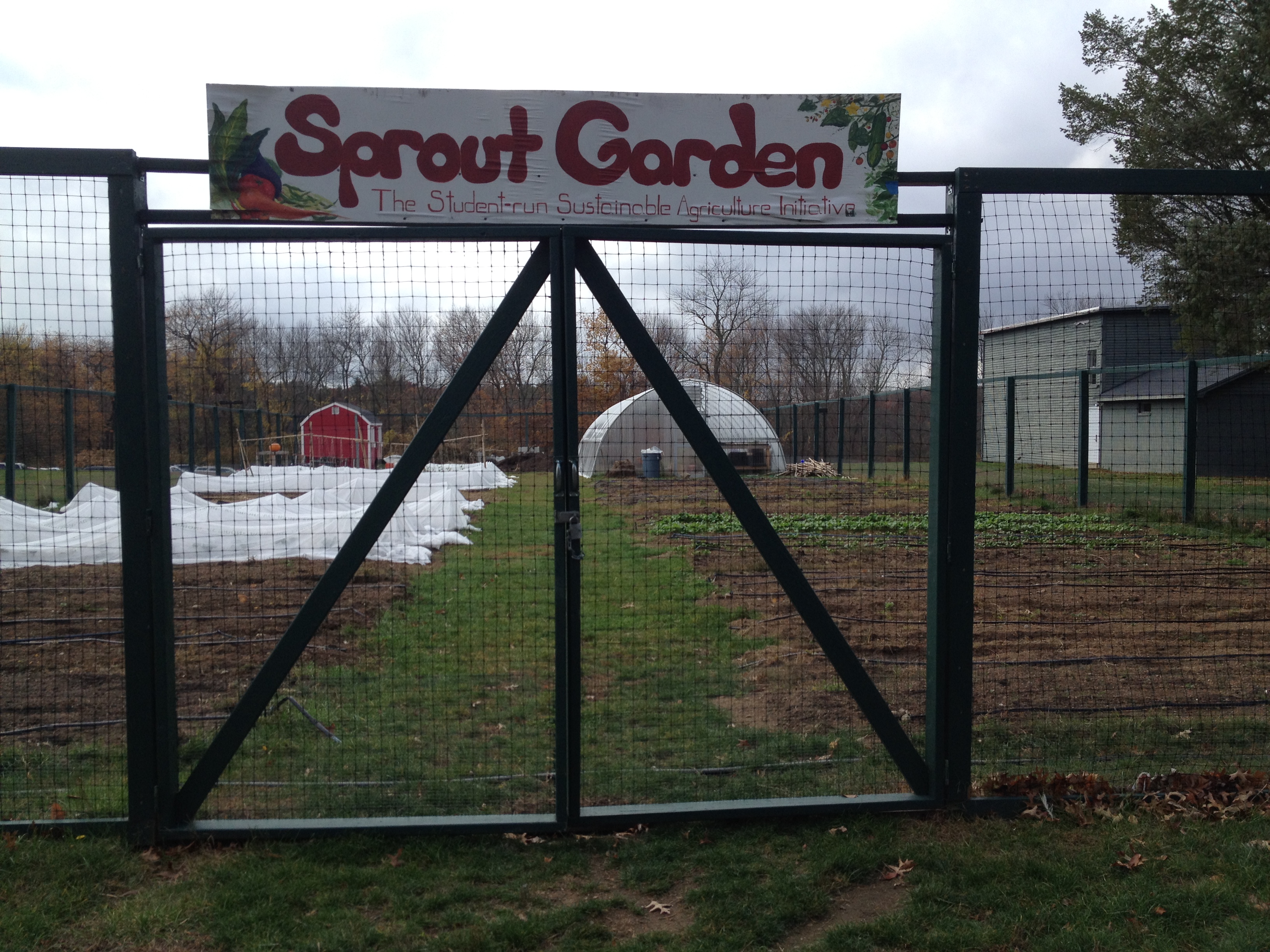
The Sprout Garden epitomizes time’s evanescence. As I walked in the garden at the end of summer, I worried about how weeds would eventually overtake the ripe vegetables and fruits. Fortunately, however, the student gardeners that arrived in the fall dispelled my fears that the summer’s work would go to waste.
When I met the other students, I knew our teamwork would make our garden the best it has ever been. We planned out the fall crop sections during our weekly meetings and divided the garden in order to manage each portion. Our planning has helped us to prioritize our tasks and remain organized.
We let the sunflowers and last three basil plants seed in the hopes that birds would peck away the pests and that individuals would enjoy the sunflower seeds and the sight of beautiful Velvet Queen sunflowers in the future. We also have covered our hoop house to allow us to grow greens and roots all winter long. Our effort to cover the hoop house went more smoothly than ever before, with more than 10 student and staff volunteers showing up to help. We owe a special thanks to the four Library staff that came up to help with this effort!
This fall, we had the honor to meet with one of the major donors who has supported the expansion and ongoing success of the Sprout Garden. We gave her a grand tour of the garden. She was impressed with the amount of hard work we had contributed to the garden and wished us luck for the winter season. Sure enough, it has been a terrific semester with the help of such caring and invested student gardeners.
Continue ReadingThis year, the Connecticut College Office of Sustainability has partnered with the New London County Food Policy Council (NLCFPC), hiring student fellows to help implement the plans of the Council. NLCFPC works to reduce food insecurity, improve diet-related health, and expand the viability of local agriculture throughout New London county. There are fellows working in five different areas to accomplish these goals. Each fellow works with community partners, allowing the fellows to make real connections with the community at large and to make lasting impacts.
The Emergency and Supplemental Food Systems Fellow, Ariana Pazmino ’18, and the Food Insecurity Fellow, Emma Galante ’15, work together to increase access to sustainable food in the county. Ariana collaborates with the Gemma E. Moran Food Center and Emma focuses on SNAP (Supplemental Nutrition Assistance Program)/WIC (Special Supplemental Nutrition Program for Women, Infants and Children) benefits. The Nutrition Education Fellow, Paige Ziplow ’15, meets with the Farm to School coordinator in the county to develop high school level workshops for students on sustainable food as well as curriculum for preschoolers and their parents and teachers at the Connecticut College Children’s Program in coordination with the Holleran Center. Eleanor Hardy ’15, the Policy Fellow, concentrates on implementing policy changes that affect the food system within the county and its residents. The final area of focus is on a food hub. The Council received a grant from the USDA to conduct a food hub feasibility study in the county, so the Food Hub Fellows, Wesley Conner ’17 and Brent Lo ’16, are searching for a consultant group to hire in order to complete that study.
As the Senior Fellow on the project, I oversee all of the work of the fellows, in collaboration with Josh Stoffel, Sustainability Officer at the College. Everyone is extremely excited about the impact this project can have on the county as well as the opportunities for community engagement!
Continue Reading
While the summer air made its way through Connecticut, carrots, onions, snow peas, and kale peeked through the dirt. Armed with a handy dandy post hammer, a four-foot ladder, and measuring tape, Emily and I successfully built a stable trellis system to support the growing snow peas in just two days! The addition of a tiller, new ventilation system for the hoop house and an irrigation system made the planting, weeding, and seeding processes efficient and enjoyable, even on hot and humid days.
Thanks to a kind donation from Jim Luce, Supervisor of Grounds at Connecticut College, of about seven different pepper plants, we yielded a spicy crop last summer. The types of peppers ranged from Habanero to Jamaican Hot Chocolate to Devil’s Tongue. Jim also donated eight zucchini squashes, which successfully filled a whole bed. We eliminated the raised beds at the entrance of the garden, making room for about 47 and a half beds full of popcorn corn, tomatoes, summer squash, carrots, snow peas, and kale. We also planted marigolds including African Tururu, African Special and Mexican Aztec Marigolds and three different types of sunflowers: Mammoth Sunflower, Sunshine Sunflower and Velvet Queen Sunflower.
Strategically aligned onions grew beside those beautiful sunflowers, which reached a foot prior to their harvest. Basil, meaning “king” in Greek, filled several beds. With a 184 plants, Basil certainly ruled the garden and produced delicious pesto. We look forward to another great summer season next year. In the meantime, taste the fruits of our fall labor in Harris and get involved harvesting this fall!
Continue Reading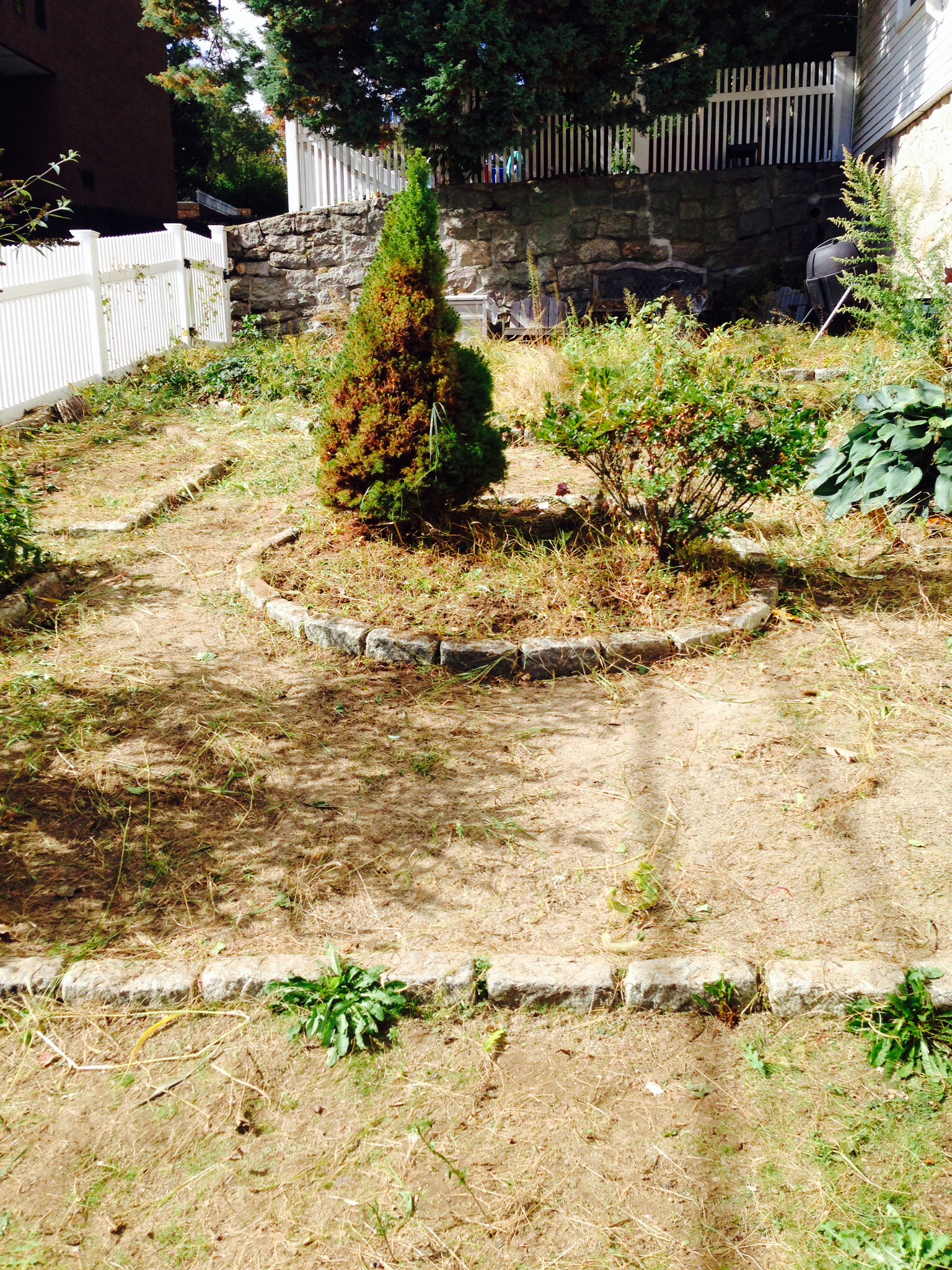
Did you know that Connecticut College has its own Children’s Program? It is located at Holmes Hall, 75 Nameaug Avenue (right down the road from the River Ridge Apartments). With about 90 students, the Children’s Program is an early childhood preschool program for young children of all backgrounds. The Program’s curriculum is based on the premise that play enables children to interact and learn from their environment. The children have enjoyed and learned from their interactions with the Children’s Program garden.
This year, the Office of Sustainability is collaborating with the Children’s Program to completely renovate the garden! We, Rebecca Brill Weitz and Soo Cho, are the Office of Sustainability fellows working on the many phases of this exciting project.
With the frost approaching, Mother Nature has set us an approaching deadline for getting work in the garden done this fall. We began our project by weeding, a hefty task given the garden’s location on prime sunny real estate. Fortunately, after just two days of weeding, we could see the layout of the garden. We now must decide how much of the current infrastructure to keep. Since the garden lies on a slope, we plan add crushed stone to all pathways in an effort to support rainwater to naturally filter into the ground.
Once we finalize the layout of the garden, we will decide on what to plant and where each plant will be placed. We will first choose the locations of the flower bulbs and garlic. The rest can be decided over a good cup of hot cocoa after the snow comes. After the bulbs are in the ground, we will mulch the garden and then let it sleep under the soft blanket of snow.
Long-term goals include building a curriculum for the students that incorporates the garden into their daily activities, mapping out the garden’s produce, and writing grant proposals. We want this garden to not only look awesome, but to be a place where the children come together to play and to grow. Keep an eye out for more updates about this amazing project!
Continue Reading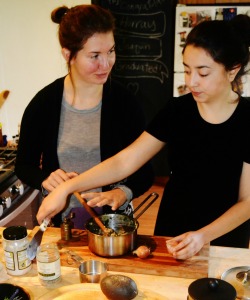
Azul Tellez and Emily MacGibeney are the Office of Sustainability’s Sprout Garden Fellows. Emily also served as a Waste Minimization Fellow in the office before going abroad for the Fall 2014 semester. They led a sustainable food initiative in Portland, Oregon this summer. Azul tells about their experience:
Emily and I spent the summer “Dishing Up Portland.” With funding from Davis 100 Projects for Peace, we made fresh and local produce more available in East and Northeast Portland, Oregon. Our project involved cooking with the produce of small Portland farms, serving the food at community events, and leading free weekly cooking classes. We also handed out educational materials such as recipe cards and encouraged people to go on our website to learn more about organic food.
Emily and I became interested in food deserts, geographic areas where affordable and nutritious food is difficult to access, through courses we’ve taken at Conn and as garden managers for Sprout. We have found that working with fresh, local and organic produce is crucially important for our health, our creativity, and taking care of the environment. The unequal distribution of such produce is extremely unjust; all people should be able to make their own, informed decisions about the quality of the food they eat and have access to it.
Based on our educational and personal backgrounds, a major question preoccupied us: what can we do to increase consumption of healthy foods, particularly fresh and local produce, in food desert areas? “Dishing Up Portland” gave us the opportunity to test how effective a project like ours can be and to gauge East Portland’s interest in and perceptions of cooking with local produce and other healthy foods.
Although Portland is known for its foodie culture and stellar restaurants, not all Portland neighborhoods are equal in that respect. Although big company stores such as Fred Meyers and Bargain Grocery Stores exist in East Portland, their organic brands are overpriced compared to the non-organic brands of food. They also have a meager selection of organic — let alone local — produce, making pre-packaged meals and low quality produce the main options for East Portlanders. Unfortunately, it simply doesn’t make economic sense for customers to buy the $6 bag of organic wild rice over the $1.25 box of mac and cheese. Lastly, while East Portland does have a number of farmers’ markets, people of lower classes often don’t find shopping at farmers’ markets worthwhile.
This is where we stepped in. We wanted to show East Portlanders that shopping at the farmers' markets and cooking with the produce that they buy there is worthwhile, from an economic, sustainability, and culinary perspective. The goal of Dishing Up Portland was to make cooking with local produce and other healthy ingredients such as whole grains and legumes feasible and not daunting. Over the course of the summer, we crafted six different meals that featured seasonal and local produce and whose costs prove that buying organic, fresh, and bulk ingredients is equally or less expensive than buying pre-made meals or conventional produce. We distributed this information at our class, our food cart, and our website, which provides readers with information to make navigating the eating-local and cooking-fresh process easier for people who have had little experience doing it before or who have never been pushed to take interest in it.
Overall, and thankfully, this general aim of our project was clear and successful. While our project was a hit among people who have a sense of the importance of sustainability and the fun of cooking, we were simply not equipped with enough time or experience to make our project reach people who do not. We hope that a local community organization will continue our efforts by using and growing our website as an educational resource.
It was a great summer. Check out our website www.dishingupportland.wordpress.com for more information about our project!
Continue Reading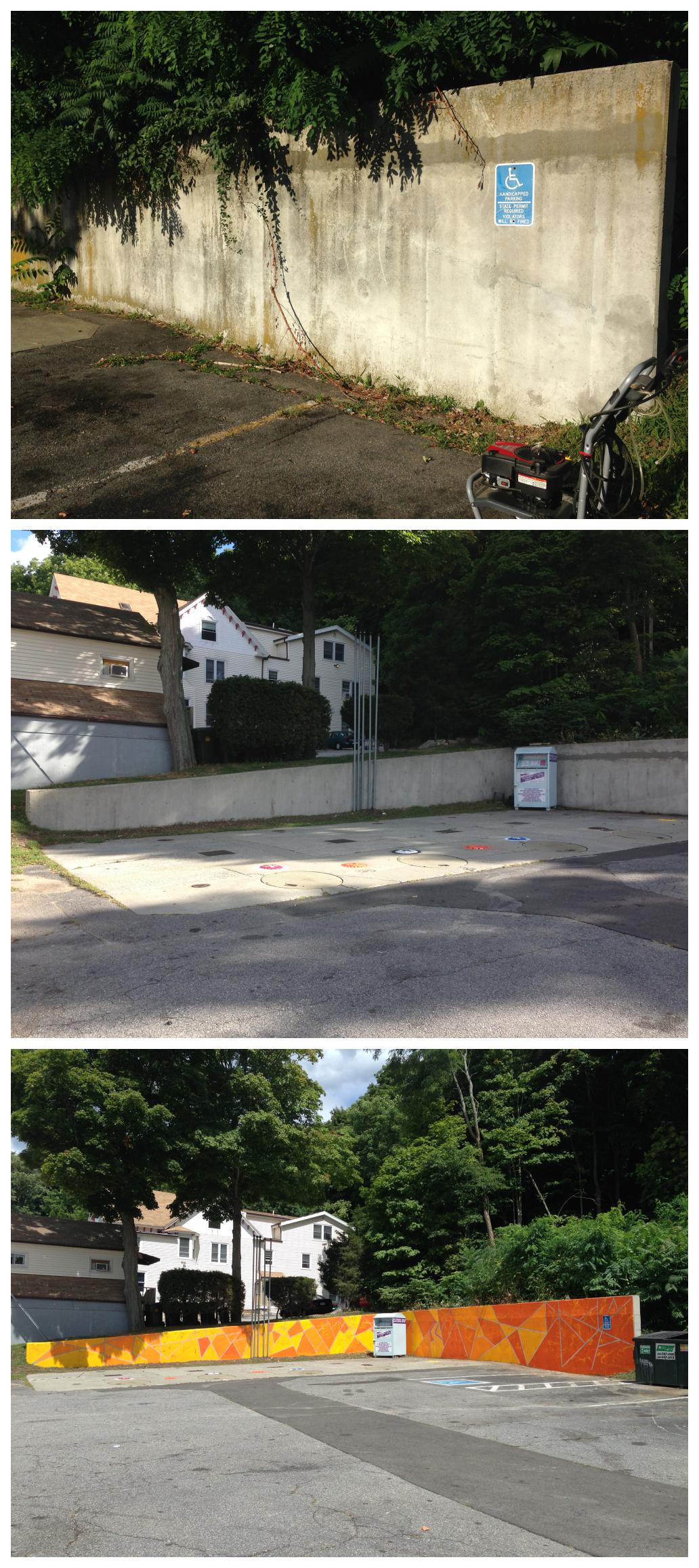
When you think of the word “sustainability,” do images of neighborhood revitalization pop into your head? If not, they should!
During Orientation, new Camels, including those enrolled in three different first-year seminars, volunteered in Hodges Square as part of the College’s New London Community Projects program. Hodges Square is a business district one mile from campus that lost some of its charm when highways separated it from downtown New London.
Continue Reading